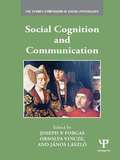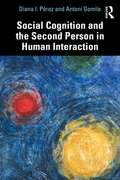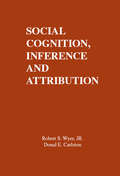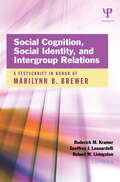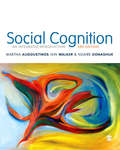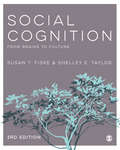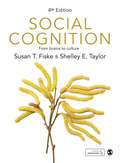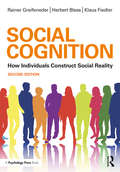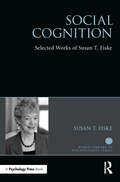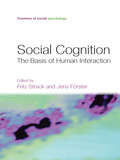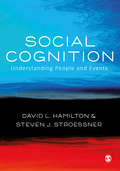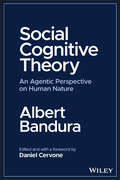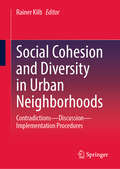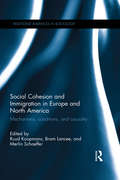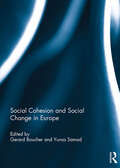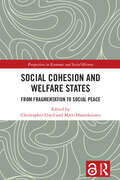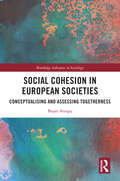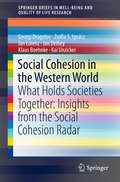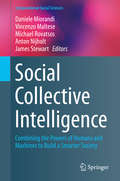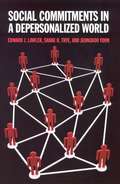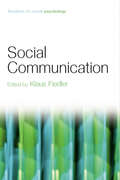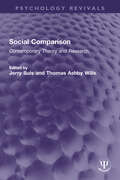- Table View
- List View
Social Cognition and Communication: Social Cognition And Communication (Sydney Symposium of Social Psychology)
by Joseph P. Forgas János László Orsolya VinczeLanguage is the essence of interpersonal behavior and social relationships, and it is social cognitive processes that determine how we produce and understand language. However, there has been surprisingly little interest in the past linking social cognition and communication. This book presents the latest cutting-edge research from a select group of leading international scholars investigating the how language shapes our thinking, and how social cognitive processes in turn influence language production and communication. The chapters represent diverse perspectives of investigating the links between language and communication, including evolutionary, linguistic, cognitive and affective approaches as well as the empirical analysis of written and spoken narratives. New methodologies are presented including the latest techniques of text analysis to illuminate the psychology of individual language users, and entire cultures and societies. The chapters address such questions as how are cognitive and identity processes reflected in language? How do affective states influence language production? Are political correctness norms in language use effective? How do partners manage to accommodate to each other’s communicative expectations? What is the role of language as a medium of interpersonal and intergroup influence? How are individual and cultural identities reflected in, and shaped by narratives in literature, school texts and the media? The book is aimed at all students, researchers and laypersons interested in the interplay between thinking and communication, and should be required reading for all professionals who use language in their everyday work to interact with people.
Social Cognition and the Second Person in Human Interaction
by Antoni Gomila Diana I. PérezThis book is a unique exploration of the idea of the "second person" in human interaction, the idea that face-to-face interactions involve a distinctive form of reciprocal mental state attributions that mediates their dynamical unfolding. Challenging the view of mental attribution as a sort of "theory of mind", Pérez and Gomila argue that the second person perspective of mental understanding is the conceptually, ontogenetically, and phylogenetically basic way of understanding mentality. Second person interaction provides the opportunity for the acquisition of concepts of mental states of increasing complexity. The book reviews the growing interest in a variety of second person phenomena, both in development and in adulthood, presenting research that shows how participants in human interaction attribute psychological states of a referentially transparent kind to each other. This review documents the spontaneous preference for face-to-face interaction, from eye contact to joint attention, from forms of vitality to communicative intentions, from interaction detection to joint action, and from synchrony to interpersonal coordination. Also looking at the implications and applications of the second person perspective within fields as diverse as art and morality, this book is fascinating reading for students and academics in social and cognitive psychology, cognitive science, neuroscience, and philosophy.
Social Cognition, Inference, and Attribution
by R. S. Wyer, Jr. D. E. CarlstonFirst published in 1979.This book developed out of a series of general discussions between the authors on research and theory in person perception and attribution phenomena. During the course of this discussion, two things became clear. First, many of the traditional approaches to investigating these phenomena, made popular during the past decade by the advent of algebraic models of information integration, were not providing answers to several fundamental questions concerning the manner in which social stimulus information is interpreted, organized, and stored in memory, and the factors that affect its retrieval and use in making judgments of the people and events to which it is relevant. Second, many fundamental issues associated with the processing of social stimulus information were relevant to phenomena investigated in a variety of traditionally segregated areas (e.g., impression formation, attribution, social comparison, interpersonal attraction, belief and opinion change, etc.). However, these commonalities were rarely identified. This appeared to result from a tendency to focus on micro-theoretical formulations developed to account for a circumscribed set of phenomena, without considering these phenomena within a broader conceptual framework. This book is an attempt to respond to these various deficiencies.
Social Cognition, Social Identity, and Intergroup Relations: A Festschrift in Honor of Marilynn B. Brewer (Psychology Press Festschrift Series)
by Roderick M. Kramer Geoffrey J. Leonardelli Robert W. LivingstonPerhaps the defining feature of humanity is the social condition -- how we think about others, identify ourselves with others, and interact with groups of others. The advances of evolutionary theory, social cognition, social identity, and intergroup relations, respectively, as major fields of inquiry have been among the crowning theoretical developments in social psychology over the past three decades. Marilynn Brewer has been a leading intellectual figure in the advancement of each of them. Her theory and research have had international impact on the way we think about the self and its relation to others. This festschrift celebrates Marilynn’s numerous contributions to social psychology, and includes original contributions from both leading and rising social psychologists from around the world. The volume will be of interest to social psychologists, industrial/organizational psychologists, clinical psychologists, and sociologists.
Social Cognition: An Integrated Introduction
by Dr Iain Walker Ngaire Donaghue Dr Martha Augoustinos'A rich intellectual feast for the reader and for the field, one that represents both theories and data that have emerged from around the world' - Kay Deaux, Distinguished Professor of Psychology and Women's Studies, City University, New York `The time is ripe for this unique integration of the formerly disparate major approaches to social psychological issues. I highly recommend this readable and exciting review of social cognition topics. The core principles of the social cognition, social identity, social representations, and discursive approaches are clearly outlined in such a way that students will truly engage with the theories' - Nyla R Branscombe, Professor of Psychology, University of Kansas With a new structure, the Second Edition of this critically acclaimed textbook represents a much more `integrated' and pedagogically developed account of its predecessor. The authors examine the different theoretical and methodological accomplishments of the field by focusing on the four major and influential perspectives which have currency in social psychology today - social cognition, social identity, social representations and discursive psychology. A foundational chapter presenting an account of these perspectives is then followed by topic-based chapters from the point of view of each perspective in turn, discussing commonalities and divergences across each of them. Key features of Second Edition: - cross-referencing throughout the text - especially to the foundational chapter - key terms in bold which refer to a glossary at the back of the textbook - extensive pedagogical features: textboxes illustrating key studies, effective summaries and further readings in every chapter.
Social Cognition: From brains to culture
by Shelley E. Taylor Susan T. FiskeHow do people make sense of each other? How do people make sense of themselves? Social cognition attempts to explain the most fundamental of questions. It looks at why other people are not simply ‘objects’ to be perceived and how the social world provides dramatic and complex perspectives on the Self and Others. The subtitle of this book ‘From Brains to Culture’ reflects the journey that Social Cognition has been on since it first emerged as a dynamic and forward-looking field of research within social psychology. Structured in four clear parts, Social Cognition: From Brains to Culture begins with a clear outline of the basic concepts before moving into more topical sections: understanding individual selves and others, followed by making sense of society. The authors finish by looking beyond cognition to affect and behaviour. Challenging and rigorous, yet strikingly accessible, this book is essential reading for all students of social psychology from undergraduate to post-graduate and beyond.
Social Cognition: From brains to culture
by Shelley E. Taylor Susan T. FiskeHow do people make sense of each other? How do people make sense of themselves? Social cognition attempts to explain the most fundamental of questions. It looks at why other people are not simply ‘objects’ to be perceived and how the social world provides dramatic and complex perspectives on the Self and Others. The subtitle of this book ‘From Brains to Culture’ reflects the journey that Social Cognition has been on since it first emerged as a dynamic and forward-looking field of research within social psychology. Structured in four clear parts, Social Cognition: From Brains to Culture begins with a clear outline of the basic concepts before moving into more topical sections: understanding individual selves and others, followed by making sense of society. The authors finish by looking beyond cognition to affect and behaviour. Challenging and rigorous, yet strikingly accessible, this book is essential reading for all students of social psychology from undergraduate to post-graduate and beyond.
Social Cognition: From brains to culture
by Shelley E. Taylor Susan T. FiskeThe social world is complicated and our minds are limited, so we take shortcuts. You have to make quick decisions – this person is dangerous, this one is not. The shortcuts we take mostly work well enough, because, after all, we survive. But some are deeply unjust, including racial or social class categories or other unfair stereotypes. This book will help you understand how these shortcuts work, why they exist, and how they are changing. There are examples in each chapter which * Show applications in the real world to help with your understanding * Highlight significant pieces of research to help you demonstrate knowledge of a wide range of sources * Explain researching in social cognition to improve your skills and give ideas for your own research. Check out the accompanying online resources for more.
Social Cognition: From brains to culture
by Shelley E. Taylor Susan T. FiskeThe social world is complicated and our minds are limited, so we take shortcuts. You have to make quick decisions – this person is dangerous, this one is not. The shortcuts we take mostly work well enough, because, after all, we survive. But some are deeply unjust, including racial or social class categories or other unfair stereotypes. This book will help you understand how these shortcuts work, why they exist, and how they are changing. There are examples in each chapter which * Show applications in the real world to help with your understanding * Highlight significant pieces of research to help you demonstrate knowledge of a wide range of sources * Explain researching in social cognition to improve your skills and give ideas for your own research. Check out the accompanying online resources for more.
Social Cognition: How Individuals Construct Social Reality (Social Psychology Ser.)
by Klaus Fiedler Rainer Greifeneder Herbert BlessSocial cognition is a key area of social psychology, which focuses on cognitive processes that are involved when individuals make sense of, and navigate in their social world. For instance, individuals need to understand what they perceive, they learn and recall information from memory, they form judgments and decisions, they communicate with others, and they regulate their behavior. While all of these topics are also key to other fields of psychological research, it’s the social world—which is dynamic, complex, and often ambiguous—that creates particular demands. This accessible book introduces the basic themes within social cognition and asks questions such as: How do individuals think and feel about themselves and others? How do they make sense of their social environment? How do they interact with others in their social world? The book is organized along an idealized sequence of social information processing that starts at perceiving and encoding, and moves on to learning, judging, and communicating. It covers not only processes internal to the individual, but also facets of the environment that constrain cognitive processing. Throughout the book, student learning is fostered with examples, additional materials, and discussion questions. With its subdivision in ten chapters, the book is suitable both for self-study and as companion material for those teaching a semester-long course. This is the ideal comprehensive introduction to this thriving and captivating field of research for students of psychology.
Social Cognition: Selected Works of Susan Fiske (World Library of Psychologists)
by Susan Professor FiskeIn the World Library of Psychologists series, international experts present career-long collections of what they judge to be their finest pieces—extracts from books, key articles, salient research findings, and their major practical theoretical contributions. Susan T. Fiske has an international reputation as an eminent scholar and pioneer in the field of social cognition. Throughout her distinguished career, she has investigated how people make sense of other people, using shortcuts that reveal prejudices and stereotypes. Her research in particular addresses how these biases are encouraged or discouraged by social relationships, such as cooperation, competition, and power. In 2013, she was elected to the National Academy of Sciences, and, in 2011, to the British Academy. She has also won several scientific honours, including the Guggenheim Fellowship, the APA Distinguished Scientific Contributions Award, the APS William James Fellow Award, as well as the European Federation of Psychologists’ Associations Wundt-James Award and honorary degrees in Belgium, the Netherlands, Spain, and Switzerland. This collection of selected publications illustrates the foundations of modern social cognition research and its development in the late twentieth and early twenty-first century. In a specially written introductory chapter, Fiske traces the key advances in social cognition throughout her career, and so this book will be invaluable reading for students and researchers in social cognition, person perception, and intergroup bias.
Social Cognition: The Basis of Human Interaction (Frontiers of Social Psychology)
by Fritz Strack Jens FörsterSocial cognition is an area of social psychology that has been flourishing over the past two decades. It has harnessed basic concepts from cognitive psychology and developed and refined them to explain human thinking, feeling, and acting in a social context. Moreover, social cognition has integrated emotional influences and unconscious processes to reach a more complete understanding of social psychological phenomena. In this volume, the reader will find a representative sample of outstanding research in the field of social cognition. The chapters address its central themes, roughly organized along the temporal axis of information processing. They include basic operations like perception, categorization, representation, and judgmental inferences. Other chapters focus on issues like social comparison, emotion, language and culture. All of the contributors are internationally-renowned experts who share with the reader their accounts of the research experience in each of their domains. Social Cognition: The Basis of Human Interaction is an invaluable resource for researchers requiring a comprehensive, yet concise, overview of the field, and may also be used by intermediate and advanced students of social cognition.
Social Cognition: Understanding People and Events
by David L. Hamilton Steven N. StroessnerSocial cognition is an approach to understanding how people think about people and events. We are constantly processing information to navigate the world we live in. The authors will guide your students, using examples and up-to-date studies, through this approach; from explaining the processes themselves right through to demonstrating the role cognitive processes play in our social lives. With chapters on the following processes: · Memory · Judgement · Attention · Attribution · Evaluation · Automatic processing. This book will provide your students with a framework for understanding the most common areas of interest for Social Cognition, such as perception, attitudes and stereotyping.
Social Cognition: Understanding People and Events
by David L. Hamilton Steven N. StroessnerSocial cognition is an approach to understanding how people think about people and events. We are constantly processing information to navigate the world we live in. The authors will guide your students, using examples and up-to-date studies, through this approach; from explaining the processes themselves right through to demonstrating the role cognitive processes play in our social lives. With chapters on the following processes: · Memory · Judgement · Attention · Attribution · Evaluation · Automatic processing. This book will provide your students with a framework for understanding the most common areas of interest for Social Cognition, such as perception, attitudes and stereotyping.
Social Cognitive Theory: An Agentic Perspective on Human Nature
by Albert BanduraA comprehensive perspective on human nature by one of the undisputed masters of the psychological sciences The final book by psychology's most eminent modern figure, Dr. Albert Bandura, is the definitive concise presentation of his theoretical views. In Social Cognitive Theory: An Agentic Perspective on Human Nature, Bandura explains how his half-century of research and theory on the determinants of thought and action highlight people's capacity for agency: the ability to exert control over one's actions and the courses of one's development. He further explains how his basic theory and research have been applied, world-wide, for the betterment of the human condition. Readers will find: A thorough introduction to the author’s agentic-perspective on human nature Dr. Bandura's theoretical analyses of moral behavior and moral disengagement Applications of the basic principles of Social Cognitive Theory to personal and social change for human betterment An essential and groundbreaking resource for educational, health, and personality psychologists, Social Cognitive Theory: An Agentic Perspective on Human Nature will also prove indispensable to social and industrial/organizational psychologists.
Social Cohesion and Diversity in Urban Neighborhoods: Contradictions - Discussion - Implementation Procedures
by Rainer KilbIn the current urban development debate, the vision of a diverse urban neighborhood is often linked with social cohesion as a target aspect of favorable community development. This initially euphemistic connection is in need of explanation, as valid empirical findings suggest that with increasing socio-economic and socio-cultural differentiation, the probability of conflict becomes more pronounced, and social cohesion is likely to decrease. Nevertheless, this connection should be maintained, as social science findings on social polarization and segregation, social segmentation, and fragmentation indicate that urban spatial structures should be designed in such a way that social diversity among residents not only coexists but can also become cooperatively action-oriented within the framework of a community. The resulting conflicts of interest can, in their constructive version, serve as impulses for democratic understanding and decision-making. However, this requires integrative and manageable components, which a well-planned urban neighborhood can provide more effectively than urban sprawl or additive high-density residential silos developed solely for economic yield. How a diverse neighborhood could be planned, designed, implemented, and supported in its community-building process is illustrated and reflected upon using the example of a new neighborhood emerging in Mannheim.
Social Cohesion and Immigration in Europe and North America: Mechanisms, Conditions, and Causality (Routledge Advances in Sociology)
by Ruud Koopmans Bram Lancee Merlin SchaefferConcerns about immigration and the rising visibility of minorities have triggered a lively scholarly debate on the consequences of ethnic diversity for trust, cooperation, and other aspects of social cohesion. In this accessibly written volume, leading scholars explore where, when, and why ethnic diversity affects social cohesion by way of analyses covering the major European immigration countries, as well as the United States and Canada. They explore the merits of competing theoretical accounts and give rare insights into the underlying mechanisms through which diversity affects social cohesion. The volume offers a nuanced picture of the topic by explicitly exploring the conditions under which ethnic diversity affects the ‘glue’ that holds societies together. With its interdisciplinary perspective and contributions by sociologists, political scientists, social psychologists, as well as economists, the book offers the most comprehensive analysis of the link between ethnic diversity and social cohesion that is currently available.
Social Cohesion and Social Change in Europe
by Gerard Boucher and Yunas SamadSocial cohesion has had different meanings for people depending on their background, their interests, where they live in the world, and at what time they lived. In the social sciences, social cohesion is a term used to explain the social and cultural consequences of structural changes related to industrialization and modernity. In the European Union, structural changes which relate to globalization, European integration, the restructuring of welfare states, ageing societies, and transitions from communism, have often led to more insecurity and material inequalities between people. Higher rates of immigration, and issues related to the integration of migrants and their descendants, have also led to anxieties about the preservation of national cultures and identities. This book argues that perceived crises in social cohesion in Europe have more to do with the consequences of structural change rather than the failure of multiculturalism and immigration. It looks at the relationship between social cohesion and social change in Europe, focusing on the European Union as a whole, and on urban areas such as Paris, France and Bradford, UK. This book was originally published as a special issue of Patterns of Prejudice.
Social Cohesion and Welfare States: From Fragmentation to Social Peace (Perspectives in Economic and Social History)
by Christopher Lloyd Matti HannikainenAiming to go beyond reiterating the stereotypical narrative of the rise of welfare states, this interdisciplinary book examines the long-run historical processes of the development of the welfare state. It focuses on the complex political, social, economic and institutional transformations which give rise to these peaceful and cohesive societies. Welfare is crucial to the story of peaceful social integration and this book explores and explains this vital connection, taking a non-linear view of the history of moving from fragmentation to peace with comprehensive welfare institutions. Chapters collectively focus on three central areas: (a) types of socio-political fragmentation, (b) the interconnection of social, political, and economic forces that led to the institutionalisation of integrationist processes and policies (including re-distributional welfare systems), and (c) how this new institutional development helped achieve, or failed to achieve, social peace and welfare. The international panel of expert contributors provide case studies from a rich variety of country contexts, including Germany, South Africa, the Netherlands, Austria, and the Nordic Countries. This thought-provoking collection of essays is well suited for advanced students and researchers in social history, economic history, political economy and social policy.
Social Cohesion in European Societies: Conceptualising and Assessing Togetherness (Routledge Advances in Sociology)
by Bujar AruqajThis book explains the concept of social cohesion in the context of a comparative sociological study. It proposes an innovative approach to the measurement of social cohesion, considering as constitutive elements social trust, institutional trust, and societies’ degree of openness. Aruqaj observes these elements across time and on multiple social levels: individual (socio-economic inequalities and ethno-linguistic diversification); group (social categorisations and regional statistics of religious, gender, social status, and migration differences); and societal (reflecting the quality of life and human capabilities). This book provides an analysis of social cohesion not only between but also within European societies. It will appeal to students and scholars interested in solidarity and social integration working in sociology, social psychology, and development studies.
Social Cohesion in the Western World
by Jan Delhey Georgi Dragolov Zsófia S. Ignácz Jan Lorenz Klaus Boehnke Kai UnzickerMany people in the Western world are concerned that the social fabric ofsocieties is fraying. This book constitutes the first-of-its-kind systematicaccount of social cohesion, from theory through methodology to empiricalevidence. Readers are introduced to the academically developed Social CohesionRadar of Bertelsmann Stiftung, a globally active non-governmental organization. The Social Cohesion Radar defines and measures cohesion as characterized bythree core aspects: resilient social relations, positive emotionalconnectedness between people and the community, and a pronounced focus on thecommon good. Using high-quality academic and institutional data sources, theSocial Cohesion Radar provides insights into the level and development ofsocial cohesion over a period of almost 25 years internationally, among 34European Union and OECD members, and regionally, among the 16 federal states ofGermany. It further provides insights into what influences cohesion, and whatcohesion is good for. One of the key findings is that social cohesion promotesa happier life for everyone.
Social Collective Intelligence
by James Stewart Anton Nijholt Daniele Miorandi Vincenzo Maltese Michael RovatsosThe book focuses on Social Collective Intelligence, a term used to denote a class of socio-technical systems that combine, in a coordinated way, the strengths of humans, machines and collectives in terms of competences, knowledge and problem solving capabilities with the communication, computing and storage capabilities of advanced ICT. Social Collective Intelligence opens a number of challenges for researchers in both computer science and social sciences; at the same time it provides an innovative approach to solve challenges in diverse application domains, ranging from health to education and organization of work. The book will provide a cohesive and holistic treatment of Social Collective Intelligence, including challenges emerging in various disciplines (computer science, sociology, ethics) and opportunities for innovating in various application areas. By going through the book the reader will gauge insight and knowledge into the challenges and opportunities provided by this new, exciting, field of investigation. Benefits for scientists will be in terms of accessing a comprehensive treatment of the open research challenges in a multidisciplinary perspective. Benefits for practitioners and applied researchers will be in terms of access to novel approaches to tackle relevant problems in their field. Benefits for policy-makers and public bodies representatives will be in terms of understanding how technological advances can support them in supporting the progress of society and economy.
Social Commitments in a Depersonalized World
by Edward J. Lawler Jeongkoo Yoon Shane R. ThyeAs individuals’ ties to community organizations and the companies they work for weaken, many analysts worry that the fabric of our society is deteriorating. But others counter that new social networks, especially those forming online, create important and possibly even stronger social bonds than those of the past. In Social Commitments in a Depersonalized World, Edward Lawler, Shane Thye, and Jeongkoo Yoon examine interpersonal and group ties and propose a new theory of social commitments, showing that multiple interactions, group activities and, particularly, emotional attachment, are essential for creating and sustaining alignments between individuals and groups. Lawler, Thye, and Yoon acknowledge that long-term social attachments have proven fragile in a volatile economy where people increasingly form transactional associations—based not on collective interest but on what will yield the most personal advantage in a society shaped by market logic. Although person-to-group bonds may have become harder to sustain, they continue to play a vital role in maintaining healthy interactions in larger social groups from companies to communities. Drawing on classical and contemporary sociology, organizational psychology, and behavioral economics, Social Commitments in a Depersonalized World shows how affiliations—particularly those that involve a profound emotional component—can transcend merely instrumental or transactional ties and can even transform these impersonal bonds into deeply personal ones. The authors study the structures of small groups, corporations, economic transactions, and modern nation-states to determine how hierarchies, task allocation, and social identities help or hinder a group’s vitality. They find that such conditions as equal status, interdependence, and overlapping affiliations figure significantly in creating and sustaining strong person-to-group bonds. Recurring collaboration with others to achieve common goals—along with shared responsibilities and equally valued importance within an organization—promote positive and enduring feelings that enlarge a person’s experience of a group and the significance of their place within it. Employees in organizations with strong person-to-group ties experience a more unified, collective identity. They tend to work more cost effectively, meet company expectations, and better regulate their own productivity and behavior. The authors make clear that the principles of their theory have implications beyond business. With cultures pulling apart and crashing together like tectonic plates, much depends on our ability to work collectively across racial, cultural, and political divides. The new theory in Social Commitments in a Depersonalized World provides a way of thinking about how groups form and what it takes to sustain them in the modern world.
Social Communication (Frontiers of Social Psychology)
by Klaus FiedlerThis volume is devoted to the fascinating topic of social communication - fascinating because communication is ubiquitous, in that one cannot not communicate. And yet, the art of effective communication can be extremely demanding and elusive, because a tricky trade-off problem has to be solved. For communication to be successful, it must be at once informative - somehow indicating an intended direction of thought or action - as well as subtle - somehow concealing intentions and instrumental goals. Failure to meet the former criterion renders communication uncontrolled and haphazard; failure to meet the latter raises suspicion and reactance. The chapters in this volume focus on the tools and repertoires evolved by social communication in order to deal with this demanding trade-off. They represent prominent paradigms of current research at the interface of communication and social psychology, presented by leading scholars who have played crucial roles in the development of those paradigms. The sixteen chapters are grouped into four major sections: communication within and between groups and cultures; strategic communication; social communication, affect, and behaviour regulation; and social communication and adaptive behaviour regulation. Individual chapters are devoted to such intriguing topics as stereotypes and intergroup affairs, language and culture, deception and lie detection, persuasion, discussions in groups, logic of conversation, nonverbal cues, conversational implicatures, the impact of conversation situations and social distance, and the evolution of verbal communication. The volume is framed by an introduction and an epilog. Social Communication is essential reading for senior undergraduates, graduates, and researchers working in the field of social communication, language and social psychology, and related areas in social science such as communication science, linguistics, and gender studies.
Social Comparison: Contemporary Theory and Research (Psychology Revivals)
by Jerry Suls Thomas Ashby WillsAssessment of abilities, opinions, and overall feelings of self-worth, are commonly acknowledged to be influenced by how ones’ attributes compare with those of other people. In contemporary social psychology, this process is known as social comparison or interpersonal comparison. Originally published in 1991, this volume presents the most recent developments in this field of study at the time. As described in the chapters the theory has gone through several iterations, taken on new problems and research paradigms, and reached out to other social-psychological areas of study. Some of this research addresses questions that are logical extensions of Festinger’s theory; some consider questions that derive from entirely different ways of construing the comparison process from Festinger’s original approach. Although all questions are not settled, the work presented here shows how far the original social comparison theory has evolved and suggests where the next insights are likely to be found. Today it can be read in its historical contex
